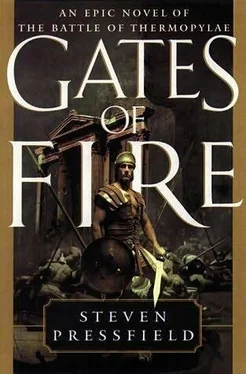Steven Pressfield - Gates of Fire - An Epic Novel of the Battle of Thermopylae
Здесь есть возможность читать онлайн «Steven Pressfield - Gates of Fire - An Epic Novel of the Battle of Thermopylae» весь текст электронной книги совершенно бесплатно (целиком полную версию без сокращений). В некоторых случаях можно слушать аудио, скачать через торрент в формате fb2 и присутствует краткое содержание. Жанр: Историческая проза, на английском языке. Описание произведения, (предисловие) а так же отзывы посетителей доступны на портале библиотеки ЛибКат.
- Название:Gates of Fire: An Epic Novel of the Battle of Thermopylae
- Автор:
- Жанр:
- Год:неизвестен
- ISBN:нет данных
- Рейтинг книги:3 / 5. Голосов: 1
-
Избранное:Добавить в избранное
- Отзывы:
-
Ваша оценка:
- 60
- 1
- 2
- 3
- 4
- 5
Gates of Fire: An Epic Novel of the Battle of Thermopylae: краткое содержание, описание и аннотация
Предлагаем к чтению аннотацию, описание, краткое содержание или предисловие (зависит от того, что написал сам автор книги «Gates of Fire: An Epic Novel of the Battle of Thermopylae»). Если вы не нашли необходимую информацию о книге — напишите в комментариях, мы постараемся отыскать её.
Gates of Fire: An Epic Novel of the Battle of Thermopylae — читать онлайн бесплатно полную книгу (весь текст) целиком
Ниже представлен текст книги, разбитый по страницам. Система сохранения места последней прочитанной страницы, позволяет с удобством читать онлайн бесплатно книгу «Gates of Fire: An Epic Novel of the Battle of Thermopylae», без необходимости каждый раз заново искать на чём Вы остановились. Поставьте закладку, и сможете в любой момент перейти на страницу, на которой закончили чтение.
Интервал:
Закладка:
Upon this Aristodemos' return alive to Sparta, he was forced to endure at the hands of the citizenry such scorn as a coward or tresante, trembler, that, now at Plataea, discovering the opportunity to redeem himself, he displayed such spectacular heroism, excelling all upon the field, as to eradicate forever his former disgrace.
The Spartans, however, spurned Aristodemos for their prize of valor, awarding this to three other warriors, Posidonius, Philokyon and Amompharetus. The commanders adjudged Aristodemos' heroics reckless and unsound, striving in blood madness alone in front of the line, clearly seeking death before his comrades' eyes to expiate the infamy of his survived at Thermopylae. The valor of Posidonius, Philokyon and Amompharetus they reckoned superior, being that of men who wish to live yet still fight magnificently.
To return to my own lot. I was detained at Athens for two summers, serving in such capacities as translator and scribe as permitted me to witness firsthand the extraordinary and unprece-dented transformation there taking place.
The ruined city rose again. With astonishing celerity the wails and port were rebuilt, the buildings of assembly and commerce, the courts and magistracies, the houses and shops and markets and factories. A second conflagration now consumed all Hellas, in particular the city of Athena, and this was the blaze of boldness and self-assurance. The hand of heaven, it seemed, had set itself in benediction upon each man's shoulder, banishing all timorous-ness and irresolution. Overnight the Greeks had seized the stage of destiny. They had defeated the mightiest army and navy in History. What lesser undertaking could now daunt them? What enterprise could they not dare.
The Athenian fleet drove His Majesty's warships back to Asia, clearing the Aegean. Trade boomed. The treasure and commerce of the world flooded into Athens.
Yet massive as was this economic recrudescence, it paled alongside the effects of victory upon the individuals, the commons of the populace themselves. A dynamism of optimism and enterprise fired each man with belief in himself and his gods. Each citizen-warrior who had endured trial of arms in the phalanx, or pulled an oar under fire on the sea now deemed himself deserving of full inclusion in all affairs and discourse of the city.
That peculiar Hellenic form of government called democra-tia, rule of the people, hod plunged its roots deep, nurtured by the blood of war; now with victory the shoot burst forth into full flower. In the Assembly and the courts, the marketplace and the magistracies, the commons thrust themselves forward with vigor and confidence.
To the Greeks, victory was proof of the might and majesty of their gods. These deities, which to our more civilised understanding appear vain and passion-possessed, riddled with folly and so prey to humanlike faults and foibles as to be unworthy of being called divine, to the Greeks embodied and personified their belief in that which was, if grander tnan human in scale, yet human in spirit and essence. The Greeks' sculpture and athletics celebrated the human form, their literature and music human passion, their discourse and philosophy human reason.
In the flush of triumph the arts exploded. No man's home, however humble, reascended from the ashes without some crowning mural, statue or memorial in thanksgiving to the gods and to the valor of their own arms. Theater and the chorus throve. The tragedies of Aeschylus and Phrynichus drew hordes to the precincts of the theatron, where noble and common, citizen and foreigner, took their stations, attending in rapt and often transported awe to works whose stature, the Greeks professed, would endure forever.
In the fall of my second year of captivity I was repatriated upon receipt of His Majesty's ransom, along with a number of other officers of the Empire, and returned to Asia.
Restored to His Majesty's service, I reassumed my responsibilities recording the affairs of the Empire. Chance, or perhaps the hand of God Ahura Mazda, found me toward the close of the following summer in the port city of Sidon, there assigned to assist in the interrogation of a ship's master of Aegina, a Greek whose galley had been driven by storm to Egypt and there been captured by Phoenician warships of His Majesty's fleet. Examining this officer's logs, I came upon an entry indicating a sea passage, the summer previous, from EpidaurusLimera, a port of Lakedaemon, to Thermopylae.
At my urging, His Majesty's officers pressed their interrogation upon this point. The Aeginetan captain declared that his vessel had been among those employed to convey a parry of Spartan officers and envoys to the dedication of a monument to the memory of the Three Hundred.
Also on board, the captain stated, was a party of Spartan women, the wives and relations of a number of the fallen.
No commerce was permitted, the captain reported, between himself and his officers and these gentlewomen. I questioned the man strenuously, but could determine neither by evidence nor by surmise if among these were included the ladies Arete and Paraleia, or the wives of any of the warriors mentioned in the papers of the man Xeones.
His vessel beached at the mouth of the Spercheios, the captain stated, at the eastern terminus of the very plain where His Majesty's army had encamped during the assault upon the Hot Gates.
The memorial party there disembarked and proceeded the final distance on foot.
Three corpses of Greek warriors, the ship's master reported, had been recovered by the natives months earlier at the upper margins of the Trachinian plain, the very pastureland upon which His Majesty's pavilion had been sited. These remains had been preserved piously by the citizens of Trachis and were restored now with honor to the Lakedaemonians.
Though certainty remains ever elusive in such matters, the bodies, common sense testifies, can have been none other than those of the Spartan Knight Doreion, the Skirite Hound and the outlaw known as Ball Player, who participated in the night raid upon His Majesty's pavilion.
The ashes of one other body, that of a warrior of Lakedaemon returned from Athens,.were borne by the Aeginetan vessel. The captain could provide no intelligence as to the identity of these remains. My heart, however, leapt at the possibility that they might be those of our narrator. I pressed the sea captain for further intelligence.
At the Rot Gates themselves, this officer declared, these final bodies and the urn of ashes were interred in the burial mound of the Lakedaemonian precinct, sited upon a knoll directly above the sea. Scrupulous interrogation of the captain as to the topography of the site permits me to conclude with near certainty that this hillock is the same whereupon the final defenders perished.
No athletic games were celebrated in memoriam, but only a simple solemn service sung in thanksgiving to Zeus Savior, Apollo, Eros and the Muses. It was ail over, the ship's master stated, in less than an hour.
The captain's preoccupations upon the site were understandably more for the tide and the security of his vessel than with the memorial events transpiring. One instance, however, struck him, he said, as singular to the point of recollection. A woman among the Spartan party had held herself discrete from the others and chose to linger, solitary, upon the site after her sisters had reassembled in preparation to depart. In fact this lady tarried so late that the captain was compelled to dispatch one of his seamen to summon her away.
I inquired earnestly after the name of this woman. The captain, not surprisingly, had neither inquired nor been informed. I pressed the question, seeking any peculiarities of dress or person which might assist in mounting a supposition as to her identity. The captain insisted that there was nothing.
Читать дальшеИнтервал:
Закладка:
Похожие книги на «Gates of Fire: An Epic Novel of the Battle of Thermopylae»
Представляем Вашему вниманию похожие книги на «Gates of Fire: An Epic Novel of the Battle of Thermopylae» списком для выбора. Мы отобрали схожую по названию и смыслу литературу в надежде предоставить читателям больше вариантов отыскать новые, интересные, ещё непрочитанные произведения.
Обсуждение, отзывы о книге «Gates of Fire: An Epic Novel of the Battle of Thermopylae» и просто собственные мнения читателей. Оставьте ваши комментарии, напишите, что Вы думаете о произведении, его смысле или главных героях. Укажите что конкретно понравилось, а что нет, и почему Вы так считаете.












